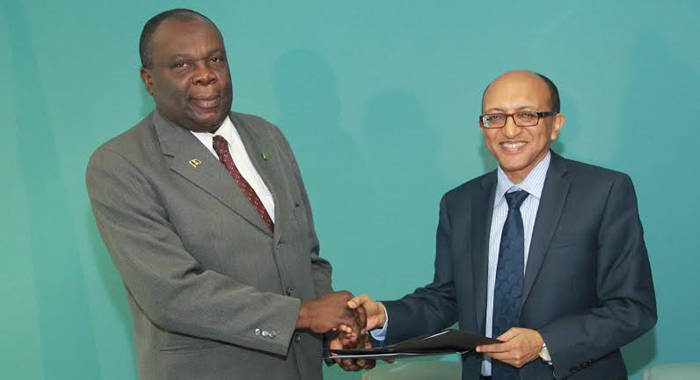By Kenton X. Chance
BRIDGETOWN, Barbados (CMC) — Agricultural research and development in the Caribbean Community (CARICOM) was given a major boost on Wednesday with the signing of memoranda of understanding (MOU) between the Caribbean Agricultural Research & Development Institute (CARDI) and two international agricultural agencies.
CARDI signed an MOU with the ACP-EU Technical Centre for Agricultural and Rural Cooperation (CTA) to collaborate on projects and other activities of mutual interest for the ultimate benefit of agricultural and rural development in the Caribbean.
The regional institute also signed a similar agreement with Inter-American Institute for Cooperation on Agriculture (IICA), a hemispheric agency that is an organ of the Organization of American States.
Speaking at the signing ceremony, CARDI executive director, Barton Clarke, said the MOU are a “re-engagement, a recommitment to assisting the people of the Caribbean in living their dream.
“Their dream of food security, their dream of being far more in charge of their destiny, their dream of economic enfranchisement, using agriculture as a vehicle,” he said at the event, which forms part of the Caribbean-Pacific Agri-Food Forum that ends here Friday.
Clarke said CARDI, the premier agricultural research and development agency within CARICOM, “is, in a sense, at a crossroads.
“And when you are at such crossroads, it is when you know who your friends are. And, in this sense, I am happy to present to you two excellent friends, in IICA and CTA,” he said.
He said CTA and IICA have assured CARDI “that whey will be in the trenches with my organisation trying to support our efforts in research and development so that we can assist in increasing production, assist in increasing productivity, assist in meeting the challenge of youth in agriculture, assist in addressing climate change, assist in increasing our capacity to be able to be producers of intellectual property of new technology.”
Clarke, who became head of CARDI in May, said he had a conversation early during his stint with key stakeholders, especially his staff.
“And we have mapped out the future we want, and we are saying that the future we want is one in which we are a premier research institution, bringing technology solutions in key areas.”
Among these key areas, he listed climate change, integrated pest management, soil and water management and plant genetic resources.
“And we cannot do so unless we have a strong partnership platform…” he said, adding that CARDI has engaged agricultural schools across the region about “how we can address and how we can help ourselves”.
Clarke said CARDI has been speaking with the government of Trinidad and Tobago about how CARDI can support their on-the-job programme.
“Because I believe we have a contribution to make, that we have to be able to build the future and the future is around young persons,” Clarke said.
CTA director, Michael Hailu, said his organisation’s partnership with IICA and CARDI is long and has been further strengthened in recent years to address real issue affecting agriculture in the region.
“What CTA brings is a different set of skills in terms of networking, in terms of linking the region with other relevant regions, especially the Pacific, where other similar issues and experiences are being addressed as well, even with Africa and Europe, in terms of scientific capacity and so on.”
Hailu said the agencies share the vision of how helping the region to transform its agriculture, and that the MOU was drafted after consultation with many stakeholders across the region.
Under the agreement, the CTA will focus on agri-businesses and value chain development and building climate resilient and nutrition-sensitive food systems.
“You have a lot of input from the technical side as well as the policy side. So we hope we can focus on these areas and really bring about some concrete result, and, of course, in partnership with institutions in the region,” Hailu said.
IICA Director General, Víctor Villalobos, said his organisation bring to the partnership a well-established networks and systems to manage knowledge and information to meet the needs of this country.
He said the institute also strong on-the-ground presence in the 34 countries of the hemisphere, including the 15 CARICOM nations.
IICA also has well-established methods and approaches to delivering training and capacity building programme in a number of technical teams, as well as solutions, methodologies and tools related with information and knowledge.
It also brings to the partnership, strong relationship and partnership with the strategic regional and international organizations and 73 years of experience of technical cooperation in the area of technology and innovation for agriculture, agricultural health and food safety, agri-business and agriculture trade, rural development and agriculture training, Villalobo said.







Another useless agreement that will only benefit the bureaucrats.